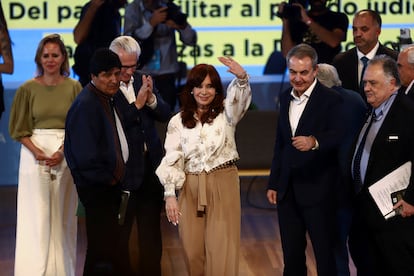From ‘soft coup’ to legal wars: the Latin American left fears a politicized justice system
The allegations of lawfare, proscription or overthrow attempts such as the one suffered by Lula in January are clouding regional politics


Progressive presidents in Latin America, or those who boast of being so, regularly complain about certain judicial decisions. In a particularly turbulent period of his ten months in power, Colombian Gustavo Petro, who had already warned of a possible conspiracy of the military to overthrow him, this week denounced a “soft coup” which threatens to decimate in Congress the Historic Pact, the left-wing coalition which brought him to power, while his proposed major legislative reforms remain stalled. Almost at the same time, Mexico’s Andrés Manuel López Obrador described the rulings that seek to halt his Administration’s flagship infrastructure works as a “technical coup”.
The ambiguity of Petro’s message -which he later explained referred to decisions by the Procurator General’s Office and not the courts- provoked criticism and confused locals and outsiders alike, but it illustrates the suspicions that have been running rampant. The idea of a politicized justice system has acquired regional dimensions. In the midst of the winds of change brought about by a new wave of left-wing governments in Latin America, in several countries there is talk of legal persecution of the new pink wave governments. The meeting of the Puebla Group, which gathered more than a hundred Ibero-American progressive leaders in Santa Marta, in the Colombian Caribbean, at the end of last year, already discussed in its agenda the concept known as lawfare.
In that gathering, former Brazilian president Dilma Rousseff, herself impeached by her country’s Congress in 2016, denounced “the use of legal instruments to destroy presidents”. While former Colombian president Ernesto Samper criticized the “politicization of justice” that has resulted in it being fixated with leaders such as current President Luiz Inácio Lula da Silva, who was prevented from running in the 2018 elections because he was in prison -his trials were later annulled by the justice system-. In very dissimilar cases, the leaders of the Puebla Group, who have been working on the issue, denounce the “legal wars” that have affected leaders such as Lula, Dilma, Ecuador’s Rafael Correa or Bolivia’s Evo Morales. In March, they also supported Argentina’s Cristina Kirchner, and the group has even created a specialized team of legal experts to work on the different cases, including Spain’s Baltasar Garzón and Argentina’s Eugenio Raúl Zaffaroni.
Petro’s case when he was mayor of Bogota is considered an emblematic example of lawfare. The then procurator in charge of disciplinary sanctions against public officials, Alejandro Ordóñez, an ultraconservative with an incendiary rhetoric, famous for his Catholic vision of the State, deposed him and suspended him for 15 years for failures in the implementation of a new model of sanitation in the Colombian capital. Petro obtained precautionary measures in his favor in the Inter-American system of justice, and the Inter-American Court of Human Rights ruled in his favor in 2020, when it declared that the Colombian State had violated his political rights and that the powers of the Procurator General’s Office to remove elected officials by popular vote should be eliminated.
“Legal wars are an instrument for the political use of justice,” says Samper, one of the main promoters of the Puebla Group together with Chile’s Marco Enríquez-Ominami and Brazil’s Aloizio Mercadante, who was entrusted by Lula to head the Brazilian Development Bank. “It is a method of attack that has been identified especially by the right wing to question, hinder, obstruct or even break the possibility of progressive characters that can advance in politics”, he points out in a conversation with this newspaper. The legal wars are aimed at causing reputational, political and legal damage. “All lawfare ammunition has to do with affecting due process”, be it the presumption of innocence, the right to defense or the second instance. To the legal wars, Samper continues, other strategies can be added, such as sowing mistrust around the economy or fostering the feeling of institutional instability with the aim of eliminating the bases of governance.
From impeachment to the Bolsonarista assault
In Brazil, the hypothesis of a coup, which has hovered over the four years of Jair Bolsonaro’s government, became a reality on January 8 in Brasilia. On that day, a week after the inauguration of Luiz Inácio Lula da Silva, thousands of radical Bolsonaristas forced their way into the National Congress, the Planalto Palace (the seat of government) and the Supreme Court. The mobilization of the extreme right, which had been camped for weeks calling for an intervention of the Armed Forces, ended up being just a coup attempt. As of today, 1,044 people have been charged, and Bolsonaro himself is under investigation for allegedly instigating his followers.
In addition to the attempted coup in the capital, in Brazil a good part of the left considers that the impeachment that former president Rousseff suffered in 2016 was a parliamentary coup. President Lula also used the lawfare thesis to explain his imprisonment, which prevented him from participating in the 2018 elections. The disclosure of the maneuvers by the then judge Sérgio Moro and prosecutors to convict him and the filing of several pending cases contributed to strengthen his narrative that he was the victim of a legal persecution aimed at ending his political career.
“They want me jailed or dead”
In Argentina, the thesis of judicial persecution has determined the political confrontation since the beginning of the investigation of the corruption case for which Vice-President Cristina Fernández de Kirchner was sentenced to six years in prison and life ineligibility for public office. Although the ruling is not yet final, the number two of the Government has tried to install the idea of proscription. This week she made it clear by affirming, once again, that her political adversaries, among which she includes the judicial system, seek to remove her from the political scene. “They want me imprisoned or dead,” she wrote in a long letter published on her social media. She was referring to two events.
First, the assassination attempt she suffered last September 1, the most serious event that has shaken Argentina in its recent history. The Prosecutor’s Office ruled out that there was a political motive behind the attack and decided to end the investigation into the attack by focusing on the three material perpetrators. Secondly, Cristina Kirchner also alluded to her procedural situation. A court convicted her in December of defrauding the State and acquitted her of the crime of illicit association. The vice-president rejected the ruling at the time with some very harsh words: “This conviction is not a conviction under the laws of the Constitution or the Penal Code. This is a parallel State and a mafia, a judicial mafia”. And this is the climate that permeates the public conversation and the dispute between parties with less than five months to go before the presidential elections.
“Technical coup de état”
The President of Mexico, Andrés Manuel López Obrador, has for years maintained an ongoing battle with a sector of the judiciary that he considers to be linked to the country’s political past. This week, however, the president went further in his accusations and accused the judges of pursuing a “technical coup d’état” against his government. He was referring to the resolution of a federal court that ordered the definitive suspension of deforestation in four sections of the Mayan Train, one of the most important infrastructure projects of the Administration and, unlike any other, an emblem of his political program, the so-called Fourth Transformation.
López Obrador assured in any case that he will not abide by the court ruling and, therefore, the works will continue. “They will continue to want to stop the works, but they will not be able to because, according to the Constitution and the laws, we have the right to carry out works for the benefit of the people”, he said.
Sign up for our weekly newsletter to get more English-language news coverage from EL PAÍS USA Edition
Tu suscripción se está usando en otro dispositivo
¿Quieres añadir otro usuario a tu suscripción?
Si continúas leyendo en este dispositivo, no se podrá leer en el otro.
FlechaTu suscripción se está usando en otro dispositivo y solo puedes acceder a EL PAÍS desde un dispositivo a la vez.
Si quieres compartir tu cuenta, cambia tu suscripción a la modalidad Premium, así podrás añadir otro usuario. Cada uno accederá con su propia cuenta de email, lo que os permitirá personalizar vuestra experiencia en EL PAÍS.
¿Tienes una suscripción de empresa? Accede aquí para contratar más cuentas.
En el caso de no saber quién está usando tu cuenta, te recomendamos cambiar tu contraseña aquí.
Si decides continuar compartiendo tu cuenta, este mensaje se mostrará en tu dispositivo y en el de la otra persona que está usando tu cuenta de forma indefinida, afectando a tu experiencia de lectura. Puedes consultar aquí los términos y condiciones de la suscripción digital.








































